Oct 3, 2018–Oct 3, 2018 from 6:00pm–7:00pm
2018 Nierenberg Prize for Science in the Public Interest

Renowned geneticist Svante Pääbo has been selected by Scripps Institution of Oceanography at UC San Diego as the recipient of the 2018 Nierenberg Prize for Science in the Public Interest. The public is invited to attend the award ceremony and a presentation from Pääbo in a free event on Oct. 3 at 6 p.m. at the Robert Paine Scripps Forum for Science, Society and the Environment on the Scripps campus. Pääbo will discuss his breakthrough research in a lecture titled, “A Neanderthal Perspective on Human Origins.” Seating is limited and registration is required. Admission is free and parking is complimentary.
RSVP for this event by September 26.
Pääbo is a Swedish biologist and pioneer of paleogenetics, the study of preserved genetic material from the remains of ancient organisms, including ancient human DNA. He has served as director of the Department of Evolutionary Genetics at the Max Planck Institute for Evolutionary Anthropology in Leipzig, Germany, since 1997. His lab famously developed techniques and approaches to retrieve ancient DNA from archaeological and paleontological remains. Pääbo has used these techniques to sequence Neanderthal DNA, starting with mitochondrial DNA in 1999, and followed by the full genome in 2009. This high-quality Neanderthal genome sequence allowed for the reconstruction of the recent evolutionary history of our species and the discovery that that Neanderthals and modern humans interbred—and that Neanderthals contributed DNA to present-day humans who live outside Africa. By studying DNA sequences from a finger bone found in a Siberian cave, Pääbo discovered Denisovans, a previously unknown hominin group distantly related to Neanderthals. This research showed that Denisovans contributed DNA to present-day people in Asia and Oceania. Gene variants inherited from both Neanderthals and Denisovans have important physiological effects today in that they affect susceptibility to diseases such as diabetes, allergies, thromboembolism, and ulcers.Date and Time
Oct 3, 2018–Oct 3, 2018
from 6:00pm–7:00pm
Location
Scripps Seaside Forum, 8610 Kennel Way, La Jolla, CA 92037
Event Registration
Registration for this event is required
by .
Visit the registration page for details.
Event Fee
Free
Contact
Donna Shabkie • dshabkie@ucsd.edu • 858-822-0723
Audience
Faculty, Staff, Students, The General Public
Event Host
Scripps Institution of Oceanography